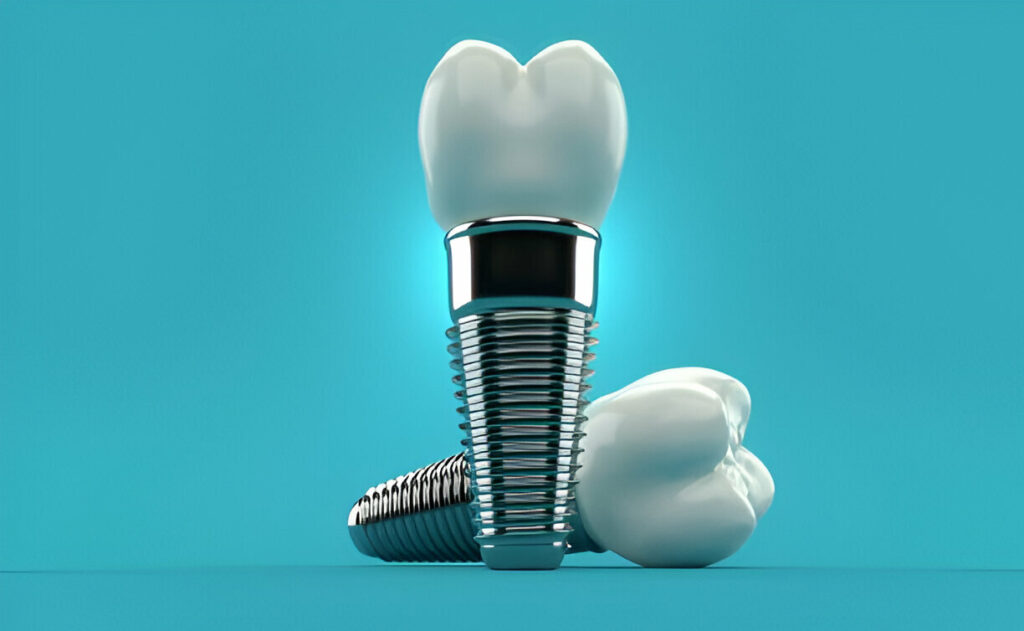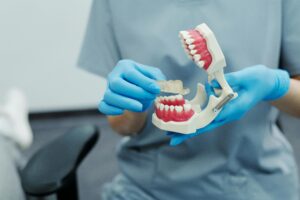Dental implants have revolutionised the way we replace missing teeth. They offer a tough and natural-looking solution. It can greatly improve oral health and looks. But how many teeth can you have on one implant? This article will explore the factors that set the number of teeth a single implant can support. It will also cover the options for those considering dental implants.
What is a Dental Implant?
A dental implant is a small titanium post that a dentist surgically inserts into the jawbone. It acts as a root for a replacement tooth or teeth. Over time, the implant fuses with the bone, creating a stable base for artificial teeth.
Single Implant for Multiple Teeth
A single dental implant can support up to three artificial teeth. This is often achieved through a procedure known as a fixed bridge. In a fixed bridge, the implant is placed in the jawbone and topped with a dental crown. This crown then supports additional crowns to form a bridge, filling the gap created by multiple missing teeth.
Benefits of Dental Implants
Dental implants are the only oral prosthetics that prevent bone loss. When a tooth is lost, the bone that once supported it begins to deteriorate. Implants provide the necessary stimulation to keep the bone healthy. They also offer a more secure and comfortable fit compared to traditional dentures.
Cost Considerations
While dental implants are more expensive than other options, they offer long-term benefits. The cost of a single implant can be higher than a set of dentures. However, multiple tooth implants can be more cost-effective in the long run. They reduce the need for additional treatments and replacements over time.
Replacing Multiple Teeth with Implants
Replacing several teeth with implants involves strategic placement. Here are the common methods:
Dental Bridges
A dental bridge can close the gap between teeth. It consists of two main parts: abutments that hold the bridge in place and pontics, the artificial teeth. If the teeth on either side of the gap are missing, implants can act as anchors for the bridge. The implants are inserted into the jawbone and allowed to fuse with the bone. Once secure, crowns are attached to the implants, supporting the bridge.
Dentures
Dentures can also be anchored with implants. Traditional dentures may slip or cause discomfort. However, implant-supported dentures provide better stability. Implants hold the dentures firmly in place, making it easier to speak and eat. There are also permanent dentures that can be attached to implants for a more secure fit.
Full Arch Replacement
For those needing a full arch replacement, all-on-4 implants are an excellent solution. This method uses four implants to support an entire arch of teeth. It is cost-effective and requires fewer implants, making it less invasive. The implants are strategically placed in the jawbone, providing a stable base for the prosthetic teeth. This option offers a complete restoration with a quicker recovery time.
The Implant Procedure
Understanding the implant procedure can help alleviate any concerns. Here’s a step-by-step guide:
- Consultation: The dentist evaluates your oral health and discusses the best options.
- Preparation: If necessary, any remaining teeth are removed, and the jawbone is prepared for the implant.
- Implant Placement: The implant is surgically inserted into the jawbone.
- Healing: The implant needs time to fuse with the bone, typically a few months.
- Abutment Placement: Once the implant is secure, an abutment is placed on top.
- Crown Placement: The final step is attaching the artificial tooth or teeth to the abutment.
Long-Term Care and Maintenance
Dental implants require care similar to natural teeth. Regular brushing, flossing, and dental check-ups are essential. Here are some tips:
- Brush twice a day with a soft-bristle toothbrush.
- Floss daily to remove plaque and food particles.
- Use an antibacterial mouthwash to keep your mouth clean.
- Visit your dentist regularly for check-ups and cleanings.
Risks and Considerations
While dental implants have a high success rate, they are not without risks. Potential complications include infection, implant failure, and nerve damage. It’s important to discuss these risks with your dentist and ensure you are a good candidate for the procedure.
Conclusion
Dental implants provide a durable and effective solution for replacing missing teeth. A single implant can support up to three artificial teeth, making it a versatile option for many patients. You may need to replace one tooth or an entire arch. Dental implants offer many benefits. They prevent bone loss and give a natural-looking smile. Speak to your dentist to determine the best course of action for your specific needs. With proper care and maintenance, dental implants can last for many years, offering a lasting solution to tooth loss.
Contact Aberdeen Dental Implant Clinic
Are you considering dental implants? The experts at Aberdeen Dental Implant Clinic are here to help. Our experienced team provides personalised care and advanced implant solutions to restore your smile and improve your oral health. Schedule your consultation today and take the first step towards a healthier, more confident you.
Frequently Asked Questions (FAQs)
Can a single implant support more than three teeth?
A single implant typically supports up to three teeth. For bigger restorations, we use multiple implants. This ensures stability and proper function.
How long do dental implants last?
With proper care and maintenance, dental implants can last many years, often decades. Regular dental check-ups and good oral hygiene are crucial for their longevity.
Is the implant procedure painful?
The implant procedure uses local anaesthesia. So, patients should not feel pain during the surgery. Some discomfort and swelling may occur after the procedure, but this is usually manageable with medication.
Are dental implants suitable for everyone?
Most people can benefit from dental implants, but a thorough evaluation by a dentist is necessary. Factors like bone density, oral health, and overall health can affect eligibility.
How do I care for my dental implants?
Care for dental implants like natural teeth. Brush twice daily and floss often. Use an antibacterial mouthwash. Also, visit your dentist for check-ups.




